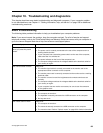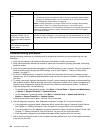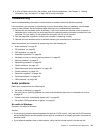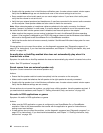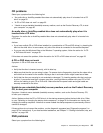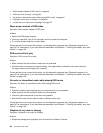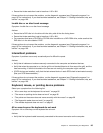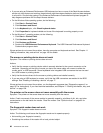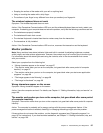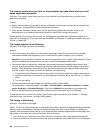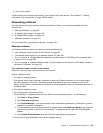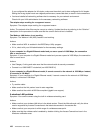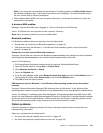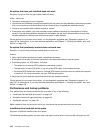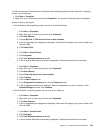
• If you are using an Enhanced Performance USB keyboard and one or more of the Rapid Access buttons
are the only keys that are not working, these buttons might have been disabled or have not been assigned
to a function. Use the help system in the Enhanced Performance Customization Keyboard program to
help diagnose problems with the Rapid Access buttons.
• On the Windows Vista operating system, do the following:
1. Click Start ➙ Control Panel.
2. Click Hardware and Sound.
3. In the Keyboard topic, click Check keyboard status.
4. Click Properties for keyboard details and to see if the keyboard is working properly or not.
• On the Windows 7 operating system, do the following:
1. Click Start ➙ Control Panel.
2. Click Hardware and Sound.
3. Click Devices and Printers.
4. Double-click USB Enhanced Performance Keyboard. The USB Enhanced Performance Keyboard
Customization program starts.
If these actions do not correct the problem, have the computer and keyboard serviced. See Chapter 11
“Getting information, help, and service” on page 109 for details.
The mouse or pointing device does not work
Symptom: The mouse or pointing device does not work.
Actions:
• Verify that the mouse or pointing-device cable is securely attached to the correct connector on the
computer. Depending on the type of mouse you have, the mouse cable will connect to either the
mouse, serial, or USB connector. Some keyboards have integrated USB connectors that can be used
for a USB mouse or pointing device.
• Verify that the device drivers for the mouse or pointing device are installed correctly.
• If you are using a USB keyboard or mouse, verify that the USB connectors are enabled in the BIOS
settings. See “Enabling or disabling a device” on page 77.
If these actions do not correct the problem, run the diagnostic programs (see “Diagnostic programs” on
page 107 for instructions). If you need technical assistance, see Chapter 11 “Getting information, help, and
service” on page 109
.
The pointer on the screen does not move smoothly with the mouse
Symptom: The pointer on the screen does not move smoothly with the mouse.
Action: Erratic movement of the mouse pointer is generally caused by a buildup of dirt, oils, and other
contaminants on the ball inside the mouse. Clean the mouse. See “Optical mouse” on page 85 for
instructions.
The ngerprint reader does not work
Symptom: The ngerprint reader does not work.
Action: The following could cause the ngerprint reader not to operate properly:
• Not enrolling your ngerprint correctly.
• Scratching the surface of the reader with a hard, pointed object.
96 ThinkCentre User Guide




